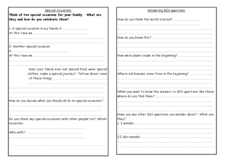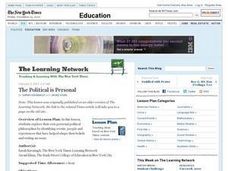Council for the Curriculum, Examinations and Assessment
Morals, Values and Beliefs
Your personality is based on the things you believe in, the morals you abide by, and the values upon which you make your decisions. Delve into a set of lessons about values and moral framework with your eighth graders as they explore and...
Curated OER
Beliefs in Traditional African Religions
While there are a few aspects of this worksheet missing, it can absolutely be useful and suit your African religions study. A worksheet is split into 3 parts: "before you read," "while you read," and "after you read." There is a chart...
Curated OER
Values and Beliefs Book
In this values and beliefs worksheet, students create a three page booklet with personal answers to questions about life, family, heroes, special people and places and right and wrong.
Curated OER
We Are Unique - Yet Also Alike
How about four engaging lessons all related to bringing cultural awareness into the classroom through the arts? Sound tempting? Sixth graders will reflect on the art, storytelling, and music of various cultures, and how each transmits...
Council for the Curriculum, Examinations and Assessment
Morals, Values, and Beliefs
OK, or not OK? As part of a study of morals, values, and beliefs, class members engage in a series of activities that help them identify their own moral code.
Curated OER
The Caste System in India
It's so important to help our pupils understand different societies and lifestyles found around the globe. They will read a very brief explanation of the traditional Caste system in India, answer 10 comprehension questions, and analyze 5...
Council for the Curriculum, Examinations and Assessment
Morals, Values, and Beliefs
What is integrity? What are the barriers that could keep a person from acting with integrity? How might these barriers be overcome? Class members tackle these questions as part of a course on Social, Physical, Emotional, Cognitive and...
Peace Corps
Features of Culture
Young scholars enumerate features of their own culture and evaluate how those features have influenced their lives. They explain that many differences are related to culture-beliefs and ways of living that are handed down from one...
Curated OER
Akhenaton
Students look into the development of religious beliefs. For this ancient civilization lesson, students research the founders of several world religions including Akhenaton. Students use their findings to create world religion charts and...
Thomas Jefferson Foundation
Personal Morals vs. Political Moves
Was Thomas Jefferson a hypocrite? That is the question facing class members as they examine excerpts from documents that relate to Jefferson's beliefs about slaves and slavery.
Curated OER
Background Beliefs
High schoolers explore the beliefs and values of others. They discover that different types of background beliefs and experiences have a profound effect upon a person's world view. They explore whether a disagreement is over facts or...
Curated OER
Chinese Philosophies & Ethical Codes
Focusing primarily on Confucianism, these slides contrast the philosophies of India with those of China - and introduce the philosophies of Legalism and Daoism as well. Your world history lecture will come alive with the clear outlines...
Curated OER
Perceptions - Frame of Reference
Young scholars understand that a person's perception or judgement of something or someone is greatly influenced by one's frame of reference including one's values, beliefs, experience and country.
Curated OER
"When They Came for Me, There Was No One Left to Speak Up" - Exploring Personal and Collective Responsibility in WWII
Students examine the underlying meaning of the phrase spoken by Pastor Martin Niemoller in 1945, "When they came for me, there was no one left to speak up." In this World History lesson, students share in a class discussion on civic and...
Curated OER
Pause for Thought
Learners discover the customs of Ramadan. In this Muslim beliefs lesson, students research the listed Web sites about the history of Ramadan, the evolution of calendars, and the separation of church and state.
Curated OER
Being Me in the Face of Adversity - Americans Who Stood Up for Their Beliefs
Young scholars identify important Americans from the colonial, revolutionary and slavery periods who are noted for standing up for their beliefs in the face of peer disapproval. They identify the importance of music in motivating and...
Curated OER
Ray Frank on The Importance of Belief
Students compare Ray Frank's biography and sermon to the importance of belief. They work in small groups to discuss their beliefs about Judaism and write letters describing their beliefs and incidents that have changed their beliefs. ...
Curated OER
The Political is Personal
Students examine their own political party affiliations and political beliefs. After reading an article, they discuss how students at Duke define their political philosophies. They brainstorm events, people and experiences that have...
PBS
Family History: Those with Lofty Ideals
Would you stand up for your beliefs, no matter the cost? Scholars investigate their own families to uncover examples of how and when someone stood up for their ideals. Using video clips, interviews, and eulogies, they come to understand...
Museum of Tolerance
The Price of Personal Responsibility
A reading of Patrick Henry's "Speech in the Virginia Convention," Henry David Thoreau's "Civil Disobedience," and Rev. Martin Luther King, Jr.'s "Letter from Birmingham Jail" launch a discussion about the price one is willing to pay to...
US Institute of Peace
Taking a Step Toward Peacebuilding
What can someone do to increase the peace? Pupils take small steps toward a big peacebuilding role in the final activity in a 15-part unit. Individuals identify their roles as a peacebuilder and create a stepping stone that reflects...
Curated OER
Shirin Neshat
Learners research the life of an artist to make a comprehensive analysis of works and how they were formed through personal beliefs of the artist. The influence upon culture is the focus of the investigation to be conducted.
Curated OER
Reacting to the Rapture
FamilyRadio.com publicized that the Rapture or Judgement Day would happen on May 21, 2011, it didn't. Informed students read a New York Times article on the topic, then answer nine related comprehension questions.
Peace Corps
Culture is Like an Iceberg
What influences the way you dress, or celebrate holidays, or connect with your friends? Explore the cultural traits that are not easily seen with an engaging discussion. Using the model of an iceberg, learners place features of culture...

























